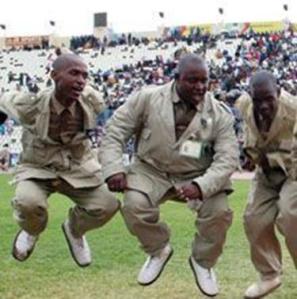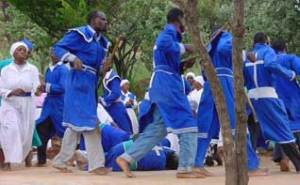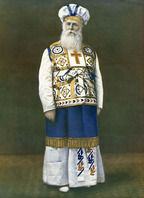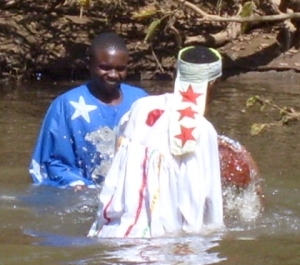Zionist Christians and Christian Zionists
Someone recently posted a picture on Facebook with a very misleading caption referring to Zionist Christians. What it should have read was Christian Zionists. There is an important difference between Zionist Christians and Christian Zionists, and I hope, in this post, to clarify the difference.
The picture above shows Christian Zionists, not Zionist Christians.
The picture on the left shows Zionist Christians, not Christian Zionists.
They are members of the Zion Christian Church (ZCC), the biggest Christian denomination in South Africa.
So what is the difference between Zionist Christians and Christian Zionists?
To put it very briefly, Zionist Christians look back to their origin in Zion City, Illinois, USA, where John Alexander Dowie fournded the Christian Catholic Apostolic Church in Zion in the 19th century.
Christian Zionists are those who believe that the modern state of Israel has an important role in the fulfilment of “biblical prophecy”. They are concerned about Mount Zion in the earthly city of Jerusalem.
Zionist Christians are really not much concerned about about the earthly Jerusalem, but for them “Zion” refers to the heavenly Jerusalem that is symbolised by an earthly “Zion City”, which Zionist Christians build on earth in various places. The first such “Zion City” to be built was Zion City, Illinois, which is just north of Chicago.
Each Zionist denomination (and there are thousands of them) builds its own “Zion City”. Zion City, Illinois is pretty secular nowadays, showing little sign of its sectarian origins, whereas Zion City, Moria, in the Limpopo Province of South Africa, is the headquaters of the biggest denomination in the country, to which millions of members flock each Easter, causing traffic jams for Africa.
Not every Zion City is as impressive as Moria. In some cases it may simply be a symbolic ring of stones, but whether big or small, plain or fancy, to Zionist Christians it symbolises the heavenly Jerusalem.
The Christian Catholic Apostolic Church in Zion was founded by John Alexander Dowie, a former Congregationalist minister, in 1896. Dowie established Zion City, Illinois, with the intention of having a model Christian community.
In about 1904, shortly after the Anglo-Boer War, Zionist missionaries who came to South Africa were joined by a Dutch Reformed evangelist in Wakkerstroom, Pieter le Roux, and his largely Zulu-speaking flock on the border between Natal and the Transvaal (the border was established after the Anglo-Boer War).
The Zionist missionaries were followed by Pentecostal ones in about 1908, and le Roux joined the Pentecostals, becoming the first leader of the Apostolic Faith Mission (AFM/AGS), one of the original Pentecostal denominations in South Africa. There was a split between those who wanted to stick to the original message of Zion, and those who followed the new teaching of Pentecost. Those who preferred Zion became known as Zionists, while those who became Pentecostal were known as Apostolic, while those who followed both traditions were known as Zion Apostolic.
There was also a split on racial lines. Le Roux spread the Pentecostal message mainly among whites, and in deference to their racial prejudices gradually distanced himself from from his former black brethren.
There was also a split among the Zionists in the USA, with Wilbur Glenn Voliva replacing John Alexander Dowie, which resulted in most Zionist missionaries being withdrawn from South Africa. So South Africa’s black Zionist Christians were on their own, though some of them continued to receive the publication Leaves of Healing from Zion City, Illinois.
But over the next hundred years they did pretty well for themselves, establishing a movement that comprises thousands of denominations. I have a database to try to keep track of them, and at the time of writing there are 3352 denominations with “Zion” as part of their name. Some, like the ZCC, are very big, while others comprise a single congregation that meets under a tree (this could be part of Dowie’s Congregationalist/Independent heritage).
Over the years in some of these denominations the original Zionist tradition has been diluted and mixed with other traditions, such as evangelical, Pentecostal and others. Some have incorporated beliefs from African traditional religion, such as using medicines for healing (Dowie believed in spiritual healing, and eschewed the use of any medicine, African or Western).
There are some characteristics of the Zionist tradition, in either theology or practice, that have been long-lived, however, and the presence of several of them in a denomination usually indicates a Zionist heritage. One of these is the use of robes. John Alexander Dowie wore quite fancy vestments, and among most Zionist Chuches members wear robes during services, usually of blue or green, with white crosses and other symbols. The particular pattern of each denomination’s robes was usually revealed to the founder of the denomination in a dream or vision. An exception is the biggest, the ZCC, where males wear khaki uniforms with black caps, while females wear green and yellow uniforms.
Apart from the robes, other characteristics that indicate a Zionist tradition include:
- Belief in divine healing, which for strict Zionists means avoiding the use of medicine, either African or Western
- Building a “Zion”, a headquarters seen as a holy city, often called Moria.
- Practising baptism by triple immersion, which is often called “triune immersion”.
- Observing food taboos, such as abstaining from pork.
Other Christian groups practise baptism by triple immersion, which the Orthodox and Coptic Churches have done from the beginning in Africa, but only Zionists refer to such baptism by the epithet “triune”, which among other Christians is reserved for describing the relations of the persons of the Holy Trinity, and not the mode of baptism. Many evangelicals and Pentecostals (but not all) baptise by single immersion, so denominations that do this usually do not have a Zionist heritage.
Zionist Christians are often seen, especially by academics, as part of a wider group that are variously called African Independent Churches, African Instituted Churches, or African Indigenous Churches (the abbreviation AICs covers them all).
Christian Zionists, on the other hand, have a somewhat different origin, and the “Zionist” in their case refers not to a theological understanding, but rather a secular political ideology.
The two main sources of Christian Zionism are Dispensationalist Theology, which arose in the 19th century, which is fairly adequately described in the Wikipedia article here. It is basically a belief in a series of periods of history called “dispensations”, and the belief that certain parts of the Bible relate to only one of these dispensations and to no others.
Some dispensationalists of the 19th century looked forward to the fulfilment of various aspects of “biblical prophecy” in their lifetimes, but were disappointed, and in the second half of the 20th century a new interpretation arose, which said that the earlier interpretations were faulty because they failed to take into account that those prophecies could only be fulfilled after the establishment of the State of Israel in 1948, and the rebuilding of the Jewish Temple in the earthly Jerusalem. Until the rebuilding of the temple takes place, in this view, the second coming of Christ cannot occur.
In the late 1960s and early 1970s these views were popularised in a series of books, the best-known of which is probably The late great planet Earth by Hal Lindsey.
Thus this particular version of Dispensationalism translates to uncritical support of the State of Israel, under which it hopes to see the temple rebuilt, which will hasten the fulfilment of the “bible prophecies” that herald the second coming of Christ.Those who believe this are generally supportive of the secular ideology of Zionism, which led to the establishment of the state of Israel, hence the name “Christian Zionists”.
The ideology of Zionism sprang from central European romantic nationalism, which was, at least in part, a reaction against the Napoleonic Empire, with roots in the thoughts of writers like Herder and Fichte. While Herder and Fichte’s ideas were the root of German nationalism, they could be applied to other nationalisms as well, including the Balkan nationalisms that led to revolts against, and the eventual downfall of the Ottoman and Austro-Hungarian Empires. Zionism and Hellenism were two of the nationalisms that arose from the same historical developments.
In the case of Zionism, many religious Jews were opposed to it, as it was a secular ideology that they thought was in conflict with the Jewish faith. For Christians, too, nationalism has often been a problem, leading to an intertwining of the religious and the secular in a way that undermines theology (see, for example, Orthodoxy and nationalism).
I hope that this will help to make clear that Christian Zionists and Zionist Christians are very different groups of people, and to confuse one group with the other is to misrepresent the ideas of both.
Trackbacks
- Orthodox Collective
- Becoming Orthodox: the actual theological problem « Khanya
- There’s a new wave of jazz sweeping South Africa | Makamba Online
- A new wave of jazz is sweeping South Africa – you don't have to travel far to find it - Mail & Guardian Africa - AFRICAN KIDS NETWORK
- The Qualitative Scientist » Traditional healers vital in treatment of HIV








Read your articles on the ZCC. . Interesting. The pictures too. Please send me your e-mail address or phone number, cell number. I am writing a paper on the Zionist churches in southern Africa. . . you can help with some info. . please. E Siwella.
Love zcc songs
Mphogo. . . . got some lyrics or tunes of Zionist songs?? Please send me what you got.
Siwella (saintmbuz@gmail.com) Thanks.
Christian Zionists belong to the Church of the Anti-Christ. The Prophecy they talk of is the Prophecy of the Anti-Christ. If Modern day Israel is what is the state in their prophecies it means the are knowingly supporting the Anti-Christ. Because the Prophecies they quote refer to the Anti-Christ.
The Bulhoek conflict near Queenstown in 1926 is of interest to AmaZioni.